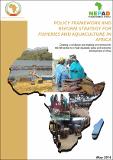Policy Framework and Reform Strategy for Fisheries and Aquaculture in Africa. May 2014

View/
Language
enDate
2014-05Type
PolicyItem Usage Stats
381
views
views
90
downloads
downloads
Description
This Policy Framework lays down the guiding principles for the strategy, namely (i) increasing fisheries and aquaculture productivity, (ii) improving profitability of fish enterprises, (iii) enhancing sustainability, (iv) wealth generation, (v) social welfare, nutrition and food security, and (vi) regional collaborative management and strengthening south-south cooperation as well as the “African Voice” on international policy dialogue which has implications for African fisheries governance. The final CAFRS and APFS – which have been brought together in a single document, now called the Policy Framework and Reform Strategy for Fisheries and Aquaculture in Africa, were validated in November 2012 at a Think Tank Event in Douala, Cameroon. Regular Think Tank Events or Participatory Policy Dialogues have characterised the process of developing the Policy Framework and Reform Strategy to ensure that the final product was needs- and evidence-based and also engendered ownership amongst stakeholders.